NEW Controlled Food System Is Now In Place & They Will Stop At Nothing To Accelerate Their Control (Video)
“Who controls the food supply controls the people; who controls the energy can control whole continents; who controls money can control the world.” This famous quote by Henry Kissinger is ringing more and more true by the week. The globalists already control the majority of the money, are moving ever so swiftly to convert the energy system over into systems they are all invested in, and have been taking drastic measures to control the food industry while running much of it under the radar. If they control the seeds they control the food, and if they control the food they can use the digital ID to control consumer access to the food. While a rash of fires suddenly destroy food processing, meat, and fertilizer plants, during a time where farmers are hurting and supply chain issues are kicking in, an entire traceable food infrastructure system has already been built in multiple cities and is making its way across the globe.
Imagine a day where farmers markets no longer exist, you can’t drive over to your local farmer to buy produce or cuts of meat, and the only food growing outside of the globalists secured indoor vertical farming and lab grown meat facilities, is in your windowsill, garden, or greenhouse.
• The indoor vertical farming industry was valued at $5.5 billion in 2020 and is projected to reach $19.86 billion by 2026. Urban indoor farming controlled by the globalists is the future of food they have reimagined, and it’s already in thousands of grocery stores without people realizing it. Whereas the U.S. is leading in this industry, this is a global agenda with vertical farms popping up across the globe.
- Buy All-American!
- Bring health and vitality back to your body with these non-transdermal patches
- Get your Vitamin B17 & Get 10% Off With Promo Code TIM
- How To Protect Yourself From 5G, EMF & RF Radiation - Use promo code TIM to save $$$
- The Very Best All-American Made Supplements On The Maret
- Grab This Bucket Of Heirloom Seeds & Save with Promo Code TIM
- Here’s A Way You Can Stockpile Food For The Future
- Stockpile Your Ammo & Save $15 On Your First Order
- Preparing Also Means Detoxifying – Here’s One Simple Way To Detoxify
- The Very Best Chlorine Dioxide
- All-American, US Prime, High Choice Grass-Fed Beef with NO mRNA, hormones or antibiotics... ever!
• For perspective, Bowery Farming’s new facility in Arlington, TX will be able to serve 16 million people in a 200-mile radius. This is only one of dozens of vertical farming companies with massive facilities across the country, backed by big investors.
• AeroFarms, who has the largest indoor vertical farming facility in the world, co-developed the first CRISPR-Cas9 gene-edited produce product, now hundreds are following, while National Geographic believes that gene editing is the next food revolution. AeroFarms also worked on an NIH sponsored trial to produce proteins for the Covid jabs.
• The University of California is developing a plant-based mRNA vaccine in the hopes that farms can grow edible vaccine heads of lettuce.
• Monsanto/Bayer is creating gene edited seeds for vertical farm companies, while Bill Gates, the Rockefeller and Ford Foundations, and the World Bank control 10% of the world’s germplasms and hold some of the world’s largest seed banks. Bayer and BASF, two of the world’s largest suppliers of seed, are both involved with the vertical farm industry.
• The USDA and FDA have already approved lab grown meat, genetically modified cattle, and are funding the globalists to research and develop cellular agriculture as well as indoor growers and genetics companies, while they slack on regulations for gene-edited produce.
• Well over a dozen major food processing and meat plants have coincidentally gone up in flames in the past several months.
• Union Pacific is mandating railroad shipping reductions by 20%, impacting CF Industries Holdings, the world’s largest fertilizer company. Vanguard, BlackRock, and State Street happen to be the top shareholders of Union Pacific, and BlackRock and Vanguard are in the top 3 shareholders of CF Industries Holdings.
• By mapping some of the biggest vertical farms (below in this report), it reveals the crops, grocery stores involved, locations, and billions pouring in by globalist investors and shareholders. It quickly becomes evident that this is the global plan to control all produce – ingredients that go into all food products.
How Did They Lock This in Under The Radar? Some Critical Points:
The food industry is already monopolized by 10 companies, the majority of which include Vanguard and BlackRock as top shareholders. What happens when they control all of the seeds, produce, and meat too? What happens when produce and meat are all grown inside secured facilities after a gene splice or inside a petri dish, and farmland becomes dormant due to overreaching regulations, lack of supplies, and manufactured inflation?
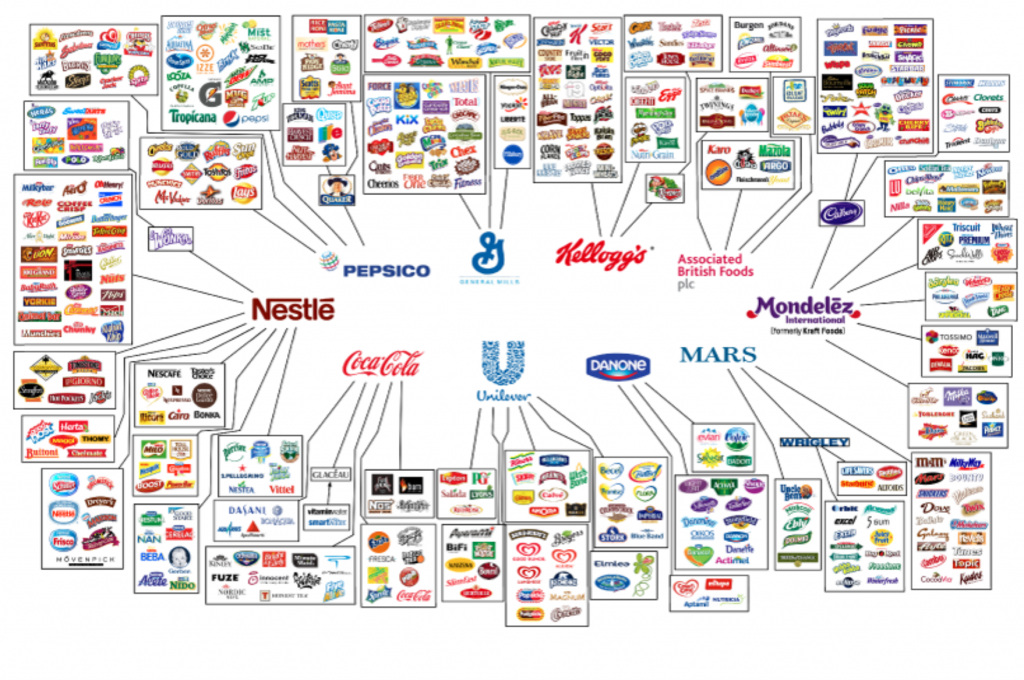
In 2014, during the Obama administration, congress established the Foundation for Food and Agriculture Research Act (FFAR) through the Farm Bill, which ultimately created a non-profit organization outside of the government with a $200 million kickoff from taxpayer dollars and additional millions in support from Bill Gates as seen here, and here. USDA Secretary Vilsack announced its creation on July 23, 2014, stating that they were appointing a 15-member board of directors which unsurprisingly included deputy director Dr. Robert Horsch of the Bill & Melinda Gates Foundation and high-ranking employees from Cargill and the Aspen Institute, among others. This new foundation would “leverage public and private resources to increase the scientific and technological research, innovation, and partnerships critical to boosting America’s agricultural economy.”
On April 2, 2019, FFAR announced they were launching Precision Indoor Plants (PIP) Consortium, a public-private partnership consisting of indoor growers, breeders, and genetics companies including AeroFarms, BASF, Benson Hill Biosystems, Fluence Bioengineering, Green Venus, Japan Plant Factory, and Priva. Their focus is on five key crops: lettuce, tomatoes, strawberries, cilantro, and blueberries, with a goal to advance speed-breeding, and to alter chemicals produced in plants that impact flavor, nutrition and medicines.
As quickly as Bill Gates was buying up farmland, money began pouring into the new future of food – urban vertical indoor farming where they claim the masses will all eventually migrate to. According to Research And Markets, the global vertical farming market was valued at $5.5 billion in 2020 and is projected to reach $19.86 billion in 2026. These growing facilities are astronomical in size as far as their ability to serve millions of people. For example, Bowery Farming is in the process of building their newest “smart” facility in Arlington, just outside of Dallas, TX, which will be capable of serving 16 million people within a 200-mile radius.
Bill Gates insists that droughts and climate change is destroying our ability to farm and that the future will consist of populations moving into metropolitan cities where indoor vertical farming is necessary to feed people. If this is the case, why has he acquired 242,000 acres of farmland over the past decade while simultaneously investing in indoor vertical farming? Who gets to sit at the table with healthy produce served up by Gates while the rest of the population eats gene-edited produce from locked-down facilities, delivered to their local grocery store, and accessed only through a digital ID?
Meanwhile, the Consultative Group of International Agriculture Research (CGIAR) holds the world’s largest private seed banks consisting of 10% of the worldwide germplasm across the globe, which is controlled by the Bill & Melinda Gates Foundation, Rockefeller and Ford Foundations, and World Bank, managing 768,576 accessions of hijacked farmers seeds.
Once the future of food through vertical farming took root, by August 2020, Monsanto/Bayer and Singapore’s sovereign fund Temasek launched a $30 million startup called Unfold which develops new vegetable seed varieties tailored to vertical farms. Bayer licensed the rights to seed germplasm from their vegetable portfolio. By 2021, they leased a 12,000 square foot laboratory research building in Davis, California. But don’t worry, rather than genetically modifying and inserting a gene into the DNA strand, like how Monsanto operated (acquired by Bayer in 2018), they only intend to cut a gene, still modifying its DNA. Perhaps this can be done in an effective and beneficial way, but at the hands of those behind all 2030 UN agendas, it gives one great pause. GMOs already account for 75-80% of food Americans consume.

There are already over 100 companies in the Sacramento area working on seed development, so it should come as no surprise that the University of California is developing a plant-based mRNA vaccine in the hopes that farms can grow edible vaccine lettuce. Sounds deliciously perfect. As with so many exciting projects such as this, the National Science Foundation granted $500,000 for this gem.
“Imagine walking into your local grocery store on a frigid January day to pick up freshly harvested lettuce, fragrant basil, juicy sweet strawberries, and ripe red tomatoes – all of which were harvested at a local farm only hours before you’d arrived.” That quote from the USDA’s article on Vertical Farming for the Future, published in October 2021, sounds so deliciously enticing and convenient, especially in anticipation of meeting the needs of 9 billion people by 2050, doesn’t it?
But, yes there’s always a “but,” what’s going to happen to the farmers when these astronomically enormous indoor vertical farm facilities have taken over every major city, locked in contracts with all major grocery store chains, and are funded by some of the same billionaire globalists who are seeking to control human beings through every industry for their fourth industrial revolution? It’s a legitimate concern. Add “gene-editing,” “smart,” “traceable,” and “net zero” to the production of these facilities, and the fact that they are still moving full speed ahead on digital IDs and currency, and it becomes even more concerning.
Sure, the idea of indoor vertical farming could be a great avenue for those with little land, those who live in harsher climates, and everyone who wants food security while these agendas against humanity continue to roll out, but wouldn’t it make more sense for communities to be doing this to meet their own needs, rather than relying on a digital ID to get access to a controlled food industry? The nutritional value from LED versus the sun likely removes some of the nutrients in the produce, but if faced with having difficulty accessing food, or not desiring gene-edited food, it might be a good idea.
Whereas this provides a lot of explanation on the absolute intentional demolition to all of our farmers on the seed, vegetable, and produce front, people should also be aware of what’s been taking place with cattle ranchers and the globalists’ plan to take over the meat industry as well. Lab grown meat has already been approved by the FDA and USDA to move forward in the U.S. and labs are eagerly filling up their petri dishes to get this ball rolling. In fact, back in September 2021, the USDA was seeking comments on the labeling of meat and poultry products derived from animals cells – in a press release that no one ever knew about. Upside Foods lab grown meat facility just launched in California, funded by Bill Gates, Temasek Holdings, and 37 other investors. Meanwhile, the USDA is still pushing for RFID surveillance of cattle and doing everything they can to control ranchers.
The USDA and FDA are fully on board with genetic modifications. First it was pigs, then it was salmon, now it’s cattle. Who knows what concoction will move from the petri dish to your dinner plate when it’s the same individuals behind every agenda.
On February 1, 2016 the Good Food Institute was launched by Bruce Friedrich with funding from the Bill & Melinda Gates Foundation, the Open Philanthropy Project, and Y Combinator, with the goal to “reimagine meat production.” In October 2021, the Good Food Institute celebrated the USDA’s $10 million grant for the creation of the first-ever National Institute for Cellular Agriculture at Tufts University so they can back researchers in manufactured meat.
To be certain all of these goals are locked into place and the UN 2030 agenda is achieved, disrupting the fertilizer industry, food supply chain, and a rash of coincidental fires to food processing plants sure would help to seal the deal, wouldn’t it?
Since the start of 2022, over a dozen major food processing and fertilizer plants have gone up in flames, exploded, or been struck by a plane crash in Arizona, Arkansas, California, Illinois, Indiana, Kansas, Louisiana, Maine, New Hampshire, North Carolina, Oregon, Texas, Washington, and Wisconsin. Nothing odd about this at all. Some articles on these fires can be found here, here, and here.

Some of the food processing plants that went up in flames:
Azure Standard Foods
Bonanza Meat Co.
Cargill-Nutrena Feed Mill
Deli Star
East Conway Beef and Pork
General Mills
Idaho’s Gem State Processing Facility
JBS
Louis Dreyfus Company, largest soybean processing and biodiesel plant in the country
Maid-Rite Steak Co.
Maricopa Food Pantry
McCrum Potato Facility
Nestle
Nutrien Ag Solutions Fertilizer Plant
Raw Farm, largest raw milk producer in the country
Rio Fresh
Shearer’s Foods
Smithfield Foods
Taylor Farms
Tyson
Wisconsin River Meats
In February, the Weaver Fertilizer Plant in Winston-Salem caught fire, burning several hundreds tons of ammonium nitrate during a time when farmers were already concerned about getting enough fertilizer due to supply chain disruptions and inflation. So in an effort to make matters worse, without any advance notice, on April 8, 2022, Union Pacific began mandating railroad shipping reductions by 20%, impacting CF Industries Holdings, the world’s largest fertilizer company. Vanguard, BlackRock, and State Street happen to be the top shareholders of Union Pacific, and BlackRock and Vanguard are in the top 3 shareholders of CF Industries Holdings, along with T. Rowe Price Associates. This will directly impact key agricultural areas such as Iowa, Illinois, Kansas, Nebraska, Texas, and California. This will ultimately effect food supply and pricing. CF Industries is only one of 30 companies dealing with these restrictions.
The Canadian National Railway (CN), which runs from New Orleans up through Illinois, branching out through Michigan and Minnesota, up into Canada, alleges to be helping the fertilizer market grow. Are any of these affected companies utilizing CN? Coincidentally, Bill Gates holds the largest ownership stake in CN.
Surely, Bill Gates and friends will save the day through their Breakthrough Energy Ventures, whereby they have heavily invested in alternative fertilizers. The Breakthrough Energy Coalition launched in 2015 and originally listed the full group of 28 involved, which has since been scraped down to Bill Gates and the occasional mention of Jeff Bezos. It’s important to understand just how large this group is and how involved they’ve become in the energy sector. Corey’s Digs covered this group in a 2019 report involving dozens of islands they were infiltrating to run alternative energy and takeover their tourism. The University of California is part of this group, as well as Jeff Bezos, George Soros, Richard Branson, Jack Ma, Mark Zuckerberg, Marc Benioff, Reid Hoffman, Tom Steyer, Meg Whitman, and Nat Simons.
Bill Gates explained his love for fertilizer in 2018 while in Tanzania. Coincidentally, Gates-led and Rockefeller-funded Alliance for a Green Revolution in Africa (AGRA) has been an epic fail, with a first ever evaluation report coming out on February 28, 2022 after a 15-year effort with bold claims to rescue Africa’s small farmers. Their false promise to “double yields and incomes for 30 million farming households by 2020” was removed from their website in June 2020 after an assessment by Tufts University revealed little evidence of progress, and in fact showed a 31% increase in hunger. Evaluators stated there were many deficiencies and AGRA’s reporting and monitoring data was weak. Even the German government is considering pulling funding from AGRA over their pesticide use, which is ironic because Gates claims we need to remove pesticides in the U.S. and move to indoor vertical farming. Yes, USAID will of course continue their support to AGRA, having already contributed $90 million taxpayer dollars thus far. Full summary here.
One of AGRA’s biggest achievements was their participation in 72 agricultural policy reforms in 11 African countries, pertaining to seed, fertilizer and market access. Laws were created to protect intellectual property rights for “certified” seeds, as penalties were created for open-source seed sharing. Imagine being a farmer, homesteader or gardener and having to share and trade seeds on the black market so you don’t get penalized. Anyone who believes they won’t try this in the U.S. is kidding themselves, especially since the globalists hold the largest private seeds banks, and invest in the largest commercial seed companies. BASF, Corteva (formerly Dupont), Syngenta (part of ChemChina), and Monsanto (now Bayer) control roughly 50% of the global seed market.
On March 17, 2022 a notice was published to the U.S. Federal Register seeking comments by May 16, 2022 on Competition and Intellectual Property System: Seeds and Other Agricultural Inputs. Remember to read through the proper lens when reviewing this document notice that derived from an executive order signed by Biden in July, 2021 on promoting competition in the American economy.
Their ultimate goal – every human being, every piece of food, resource, and product on this planet will be tracked and traced via blockchain. This isn’t a theory – it is their goal. In July, 2021, the FDA released their “New Era of Smarter Food Safety” which consists of using tech-enabled traceability for a digital, traceable food system, from farm to plate using blockchain. A digital identity to grant access to establishments, control financial spending, and trace everyone’s moves has been rolling out on multiple fronts, including the vaccine ID passport. Eventually they will try to move toward a chip, as it will be easier with biometrics being installed everywhere.
Urban, Globalist-Controlled Indoor Vertical Farming is The Future of Food
2018 video on Feeding the World: From Mendel to CRISPR, presented by Carolyn Rasmussen
For clarification, gene editing varies from genetic modification. Whereas editing removes a splice, modification inserts a splice, but ultimately, both alter the overall DNA and both have been a hot controversial topic among scientists and individuals. Kicking off the presentation, Rasmussen makes a good argument, stating that humans have been cross breeding dogs for decades and have been selecting traits in crops, have grafted them, and cross-bred them for hundreds of years, leaving everyone to feel like a simple slice removed from the genetics of a carrot or wheat is no different, and in fact is needed to make them more drought tolerant or disease resistant, while also helping them to grow faster, making them more flavorful, and allegedly nutritious.
Whereas most people might say that it’s not right to alter nature, but when faced with starvation they may change their tune. So the real question one needs to ask is, are we faced with starvation, lack of land, drought, unusable soil and farmland, and all of the other scary stories that the globalists keep insisting people should fear right now? If that were the case, would Bill Gates have purchased 242,000 acres of farmland in the worst investment of the century? Unlikely.Is it a faster, less labor-intensive, pesticide-free, more convenient, environmentally friendly and a sustainable way to grow produce – through indoor vertical farming? That one is tough to argue. It’s actually quite brilliant, if not for the investors behind it and unregulated gene-editing taking place. Creating ones own vertical farm on their property might be the best option in this case.
The World Economic Forum assures us that urban indoor farming is the way of the future for our food, both in countless articles as well as videos featuring AppHarvest and AeroFarms.
Mapping Some of The Biggest Vertical Farms: Crops, Investors, Grocers & Locations
Why The Future of Farming is in Cities – video by Venture City
When people are rushing through the grocery store to pick up food for their families, and make a b-line for the produce section to grab bags of lettuce, fresh veggies, and fruit, most people don’t pay any attention to the brand itself, they just look at the expiration date and product. Meanwhile, a good chunk of grocery chains across the country are already serving up vertically grown food without people realizing what they’re buying. Are the products tasty, healthy, nutritious enough? Have they begun rolling out vaccines into lettuce at grocery stores? How would anyone know? What products have been gene-edited? This isn’t to fear monger, it’s to point out the rapidly changing industry which people know little about, so that people can start asking questions, do a little research, and perhaps begin growing their own food.
Vertical farming substitutes soil with aeroponics, hydroponics, or aquaponics. They all claim they can produce between 300-400 times more product than traditional farming. In a 2018 report by Agrilyst on indoor farming, they reported that glass or poly greenhouses were the most dominant at 47% followed by vertical farming at 30%. Those numbers have likely flipped by now.
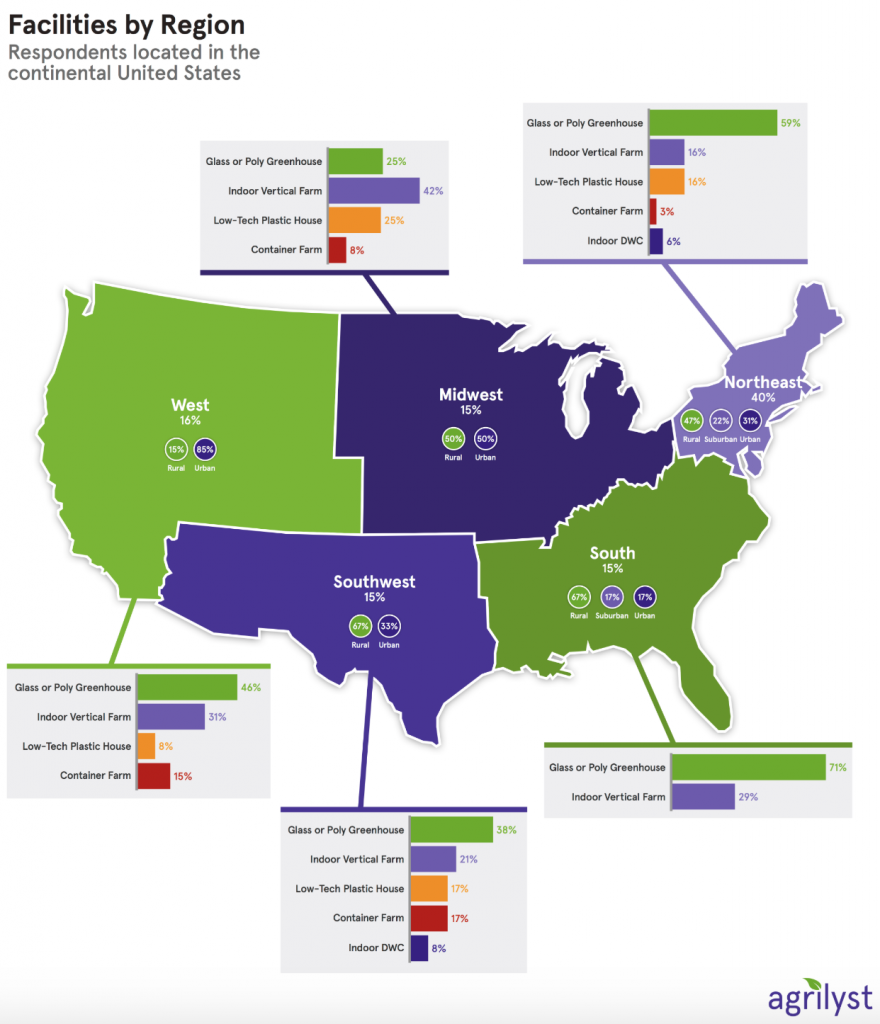
AeroFarms (Dream Holdings, Inc.) Boasts the World’s Largest Indoor Farm
Founded in 2004 by David Rosenberg, Ed Harwood, and Marc Oshima, AeroFarms is a private company based in Newark, New Jersey and has thrived for much longer than the other vertical farms in this report. Having grown over 550 different crops, some of their main products include baby kale, watercress, and rocket, which are sold under the name Dream Greens, and they are now growing berries as well.
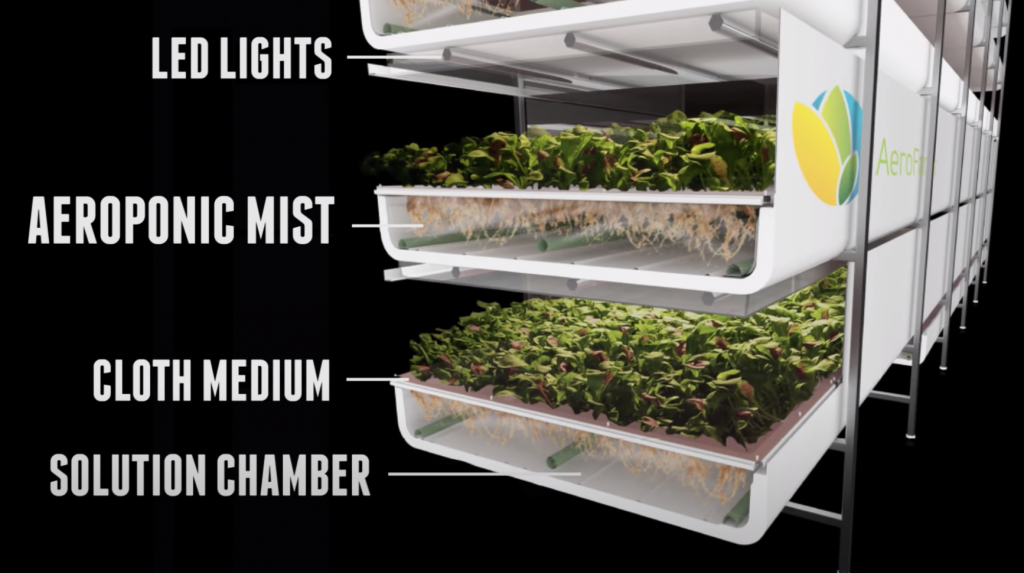
In 2017, AeroFarms received a $2 million grant from the Foundation for Food and Agriculture Research (FFAR), a nonprofit organization created in 2014 via the Farm Bill, to improve the characteristics of plants grown indoors to feed urban populations.
As of 2021, AeroFarms already had nine farms and was working on building a tenth. They state that they can go from seed to harvest in 15 days with their patented technology.
In 2021, Cargill announced its partnership with Aerofarms in a multi-year research collaboration on extending cocoa bean yields by experimenting with indoor growing technologies.
In February, 2021, the CEO of AeroFarms released a short video describing how they utilized one of their ten farms to scale up proteins for the Covid jab and boosters. They also indicated in a presentation that they had participated in growing an Active Pharmaceutical Ingredient for Covid-19 therapeutic trial sponsored by the NIH. The study on proteins from plant growth at AeroFarms and Fraunhofer, can be read here.
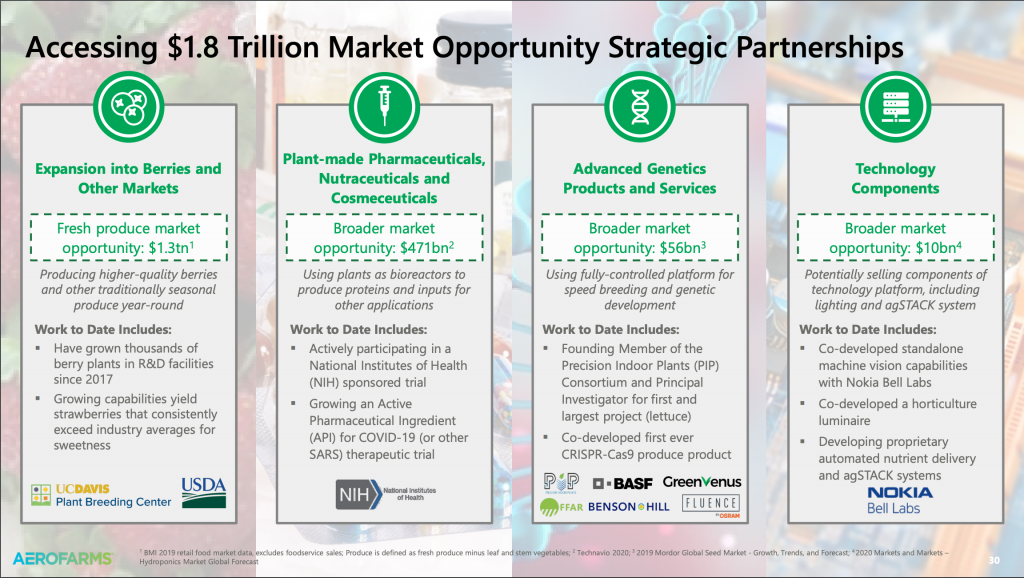
In a March 2021 SEC document pertaining to a potential merger between AeroFarms and Spring Valley Acquisition Corp, which later fell through, the CFO of AeroFarms highlighted their experience with advanced genetics, noting that:
“To be clear, we are a technology platform, not a conventional greenhouse grower using off-the-shelf equipment. We have had over 250 invention disclosures to date, a number which is constantly growing. We have grown over 550 different varieties of plants to date. We also see an addressable market in advanced genetics, using our platform for speed breeding and other genetic development work in plants. Here, we are a Founding Member of the Precision Indoor Plants Consortium and Principal Investigator for its first and largest project in lettuce. With this partnership, we work alongside companies like BASF to utilize our platform to optimize new genetics. Another example has to do with CRISPR-Cas9. If you’re not familiar, the Nobel Prize in Chemistry in 2020 went to the developers of CRISPR-Cas9, which is a genetic editing tool where scientists are able to pull out a genetic trait in a genetic sequence. Using our platform, we co-developed the first CRISPR-Cas9 produce product.”
In February 2022, AeroFarms partnered with Silal, Abu Dhabi’s leading fresh produce and agri-tech company, for a longterm research and development of transferring technology and data analytics of high tech farming systems. The goal is to improve the genetics and seedling quality of vegetables and fruit. They may also work with international consortia on developing new genotypes of crops.
AeroFarms serves grocery stores, distributors, and online grocers, some of which include:
Amazon Fresh
Baldor Specialty Foods
FreshDirect Express online grocerShopRite
Singapore Airlines
Stop and Shop
Walmart
Whole Foods
They have both commercial and research and development farms in:
Ithaca, New York
Newark, New Jersey
Danville, Virginia
Abu Dhabi
Community Farms
AeroFarms also partners with schools to teach students how to harvest their own greens. They’ve partnered with the World Economic Forum to bring community farms to Jersey City through a vertical farming initiative.
They’ve raised $238 million in funds from 13 investors:
21Ventures
Abu Dhabi Investment Office
AllianceBernstein
Cibus Fund
David Chang
Foundation for Food and Agriculture Research
GSR Ventures
Ingka Group (parent company of IKEA)
Meraas
Middleland Capital
MissionPoint Capital Partners
Newark Venture Partners
Wheatsheaf Group Ltd
According to Venture City, Ingka Group kicked them off with $500 million.
80 Acres Farms
80 Acres Farms was founded in 2015 by Mike Zelkind and Tisha Livingston and is a private company headquartered in Hamilton, OH. They provide fruits and vegetables to over 600 retail and food service locations. Their robot-powered indoor farms are said to produce 300 times more food than a conventional farm, while using 100% renewable energy and consuming 97% less water. Their farms are powered by Infinite Farms, a company out of the Netherlands that provides complete design/build services for turn-key automated indoor farms. Aside from 80 Acres Farms, Infinite Acres partners are Netherlands-based Priva Holding BV, and UK-based Ocado.
80 Acres serves over 600 retailers, grocers and national distributors, including:
Dorothy Lane Markets
Jungle Jim’s Markets
Kroger
Kroger – Ocado Solutions ecommerce channel
Restaurants
Sysco
The Fresh Market
US Foods
Whole Foods
Krogerhas been selling their greens and vegetables at 32 of their stores, and in 2021 expanded to 316 additional stores after a 15-month pilot program. These stores are all located in:
Alabama
Arkansas
Indiana
Kentucky
North Carolina
Ohio
They’ve raised $250 million in funds from 10 investors:
Barclays
Beyond Net Zero
Blue Earth Capital (backed by Partners Group and Wietlisbach Foundation)
General Atlantic
Orange Wings Capital
PG Impact Investments
QuietStar Capital
Siemens Financial Services
Taurus
Virgo Investment Group
AppHarvest
Founded in 2017 by Jonathan Webb, AppHarvest is a public company headquartered in Morehead, Kentucky. They have one of the biggest greenhouses at 2.76 million square feet on 60 acres where they solely grow tomatoes. In September 2020 they acquired Novus Capital and in April 2021 acquired Root AI. They also invested in Red Sea Farms in August 2021.
AppHarvest’s tomatoes can be found at Kroger, Meijer, and Walmart.
They’ve raised over $566 million in funds from 9 investors:
Endeavor Catalyst
Equilibrium Capital
Fidelity Management and Research Co.
Inclusive Ventures
Narya Capital
Revolution
Revolution’s Rise of the Rest Seed Fund
S2G Ventures
ValueAct Capital
Top shareholders:
Inclusive Capital Partners LP
BNP Paribas Asset Management UK
The Vanguard Group, Inc.
BlackRock Fund Advisors
Bowery Farming
Founded in 2015 by Brian Falther, David Golden, Irving Fain, Bowery is a private company based in New York, New York.
To provide a little bit of perspective as to just how big these indoor vertical farms are, Bowery Farming, who declares themself to be the largest vertical farming company in the U.S., recently announced it’s expansion into Arlington, TX, just outside of Dallas, to erect their newest “smart” indoor farm that will serve 16 million people within a 200-mile radius. What makes this facility so “smart?” According to Bowery, their farm is powered with 100% renewable energy, integrating software, hardware, sensors, computer vision systems, machine learning models, and robotics – all to “orchestrate and automate the entirety of operations.” Despite this full automated operation, they state it will provide jobs for 100 people when they open their doors in early 2023. Of course, their overall goal is to produce “traceable,” pesticide-free food to every major city in the U.S. and throughout the world.
In February 2022, Bowery acquired Traptic, a company that builds giant farming robots.
Based in New York City, Bowery already has facilities in:
Kearney, New Jersey
Nottingham, Maryland
Bethlehem, Pennsylvania
Arlington, Texas coming soon
Locust Grove, Georgia coming soon – to serve the Atlanta metropolitan area
Bowery has been serving e-commerce platforms plus over 800 grocery stores, including:
Acme (164 stores)
Amazon Fresh
Giant Food
Safeway (111 stores)
Specialty Grocers
Walmart
Weis
Whole Food Markets
They’ve raised over $646 million in 8 rounds of funding from 35 investors:
Adam Eskin
Almanac Insights
Amplo
BoxGroup
Chris Paul
Evolution VC Partners
Fidelity Management and Research Co.
First Round Capital
Flybridge
Gaingels
General Catalyst
GGV Capital
Google Ventures (GV)
Groupe Artemis
Henry Kravis
Homebrew
Jonathan Golden
Jose Andres
Justin Timberlake
Kohlberg Kravis Roberts
Lerer Hippeau
Lewis Hamilton
Matt Salzberg
Natalie Portman
Neil Blumenthal
Red Swan Ventures
RRE Ventures
Sally Robling
Sand Hill Angels
Scott Belsky
SV Angel
Temasek Holdings
Third Sphere
Tom Colicchio
Wiley Cerilli
Hydrofarm Holdings
Founded in 1977 by Peter Wartenberg, Hydrofarm is a public company headquartered in Fairless Hills, Pennsylvania. They are a distributor and manufacturer of controlled environment agriculture equipment and supplies which includes vertical farming, and saw a 28.1% net sales increase in 2021. They distribute to the U.S. and Canada.
Between 2017-2021 Hydrofarm expanded by acquiring Eddi’s Wholesale Garden Supplies, Greenstar Plant Products, Heavy 16, House & Garden, Aurora Innovations, and Innovative Growers Equipment.
Top shareholders:
Wasatch Advisors Inc
The Vanguard Group
BlackRock Fund Advisors
They’ve raised almost $123 million in funds from 4 investors:
Broadband Capital Investments
Hawthorn Equity Partners
Serruya Private Equity
SternAegis
InFarm
Founded in 2013 by Erez Galonska, Guy Galonska, and Osnat Michaeli, InFarm is a private company based in Berlin, Germany.
They use hydroponic farming in grocery stores so that the produce grows on site. They completed over 500 installations in stores and distribution centers in various parts of the world and in 2019 partnered with Kroger to do installs in QFC supermarkets in Washington state. In 2020, they expanded to QFCs in Oregon as well.
They’ve raised over $604 million in funds from 23 investors:
Archimedes Labs
Astanor Ventures
Atomico (Skype founder Niklas Zennstrom’s investment firm)
Balderton Capital
Bonnier Ventures
Cherry Ventures
EASME – EU Executive Agency for SMEs
EuropeanPioneers
FoodLabs
Hanaco Venture Capital
Haniel
Horizon 2020
IDEO
Latitude
Lightrock
LocalGlobe
Mons Investment
Partners in Equity
Qatar Investment Authority
Quadia
Star Farm Ventures
Tres Monos Capital
TriplePoint Capital
Iron Ox
Founded in 2015 by Brandon Alexander and Jon Binney, Iron Ox is a private company headquartered in San Carlos, California.
Bill Gates’ Breakthrough Energy Ventures invested $50 million in Iron Ox, a company that builds robots incorporated into hydroponic systems. These robots are equipped with sensors to detect nitrogen and acidity levels in water. Iron Ox runs farms in Northern California and Lockhart, Texas.
They’ve raised over $103 million in funds from 20 investors, with Gates’ company accounting for nearly 50% of the funding:
7percent Ventures
Amplify Partners
Anorak Ventures
At One Ventures
Avant Global
Breakthrough Energy Ventures
Cherubic Ventures
Colin Carrier
Comet Labs
Crosslink Capital
Eniac Ventures
Formic Ventures
Greg Castle
Innovating Capital
i/o Ventures
Pathbreaker Ventures
R7
Tuesday Capital
Vijay Pradeep
Y Combinator
Plenty Unlimited Inc.
Founded in 2014 by Jack Oslan, Matt Barnard, Nate Mazonson, and Nate Storey, Plenty is a private company headquartered in San Francisco, California. They use hydroponics to grow their leafy greens.
“At Plenty, we’re proud of the fresh, flavorful greens we grow in our farm, and of our transparent growing process, which lets us track a plant from seed to kitchen.” – Nate Storey, co-founder and chief science officer
Video: Vertical Farms Could Take Over The World | Hard Reset
In this video, Nate Storey says “We don’t have the land, the resources or the ability to compensate with high nutrition food.” Gosh, what happened to all of the farmland? The narrator of the video goes on to say, “picture a scenario where we got rid of all the traditional farms and replaced them with vertical farms…… this is the kind of technology and efficiency we’ll need with the Artemis base on the moon and eventually on Mars.”
Plenty serves over 430 Albertsons supermarkets in California, including Safeways and Vons, with facilities in Compton and San Francisco.
In 2020, they worked their way into some of the Whole Foods Markets in the Bay area.
In January 2022, Walmart announced its longterm partnership with Plenty with a $400 million investment, allowing for Walmart to source Plenty’s produce for all of their California stores, and Walmart also gets a position on Plenty’s Board of Directors.
Plenty’s produce can also be found at retail outlets in other California locations such as Berkeley Bowl, Good Eggs, Bi-Rite Market, and the robotic restaurant called Creator. Their website also links to online ordering at Good Eggs, Instacart, and Amazon’s Fresh Market, where you can find Plenty’s products.
Plenty’s goal is to erect 500 vertical farms in highly populated, urban areas around the world.
They’ve raised over $940 million in funds from 13 investors:
Bezos Expeditions
DCM Ventures
DCVC
Driscoll’s
Finistere Ventures
Innovation Endeavors (Eric Schmidt)
JS Capital Management
Kirenaga Partners
Louis Bacon
One Madison Group
Pete Flint
SoftBank Vision Fund
Walmart
Upward Farms
Founded in 2013 by Ben Silverman, Jason Green, and Matt La Rosa, Upward Farms is a private company headquartered in Brooklyn, New York. Though they currently only have 5 investors, they recently announced their plans to build the world’s largest indoor vertical farm in Luzerne County Pennsylvania, capping out at 250,000 square feet, by 2023.
They’ve raised over $140 million in funds from 5 investors:
Founder.org
Neue Fund
Prime Movers Lab
Recharge Thematic Ventures
Steve Jurvetson
Giant Greenhouses
In addition to all of the vertical farms going up, giant greenhouses are being erected as well. Much like AppHarvest in Kentucky, Rhode Island Grows is in the process of building one in Exeter and some Rhode Islanders aren’t too happy about it. The company projects they can yield up to 650,000 pounds of tomatoes per acre, with a goal to expand to 350 acres in five years and eventually take over 1,000 acres. Their plan is to serve six states between Boston and New York.
Over in Virginia Beach, fmr Gov. Ralph Northam announced in April 2021 that Sunny Farms, LLC will invest $59.6 million into a 120,000 square foot hydroponic greenhouse at Taylor Farms, with the plan to expand to 32 acres of building space. They will begin with lettuce and eventually grow vegetables as well.
In 2021, Shenandoah Growers, Inc. rebranded themselves as Soli Organic and plan to expand from seven farms to fifteen farms utilizing their proprietary soil-based controlled-environment system for indoor agriculture. Moving to this ESG based strategy has brought in additional investors, including Bill Gates’ Cascade Investments. They’ve also brought on key executives formerly from Starbucks, Walmart, and Postmates.
Gotham Greens is producing produce in their climate-controlled, year-round rooftop greenhouses in Baltimore, Brooklyn, Chicago, Davis, Denver, Providence, and Queens. By adding the second greenhouse to Chicago, they’ve doubled their heads of lettuce production to 11 million heads per year. The Whole Foods building in Brooklyn is where they built their first one back in 2013, as the first giant greenhouse + supermarket combo.
Who Controls The Food Supply Controls The People
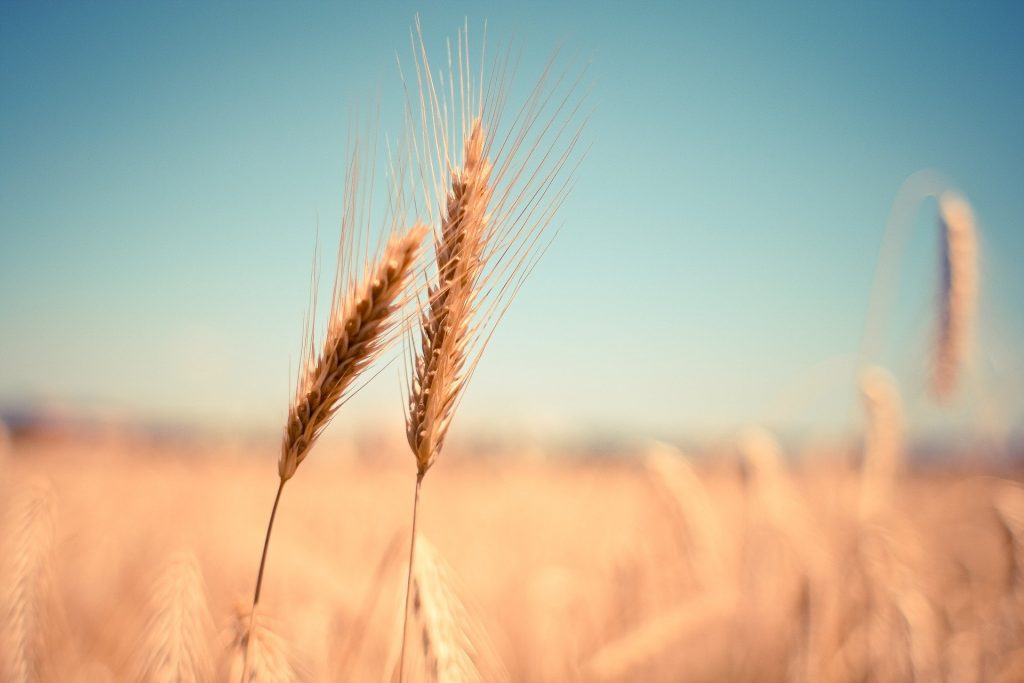
The squeeze has been taking place for decades, from the government stealing land to putting unrealistic restrictions and regulations on ranchers and farmers, controlling our free water – even rain water, selling out over 35.2 million acres of U.S. agriculture farmland to foreign investors, globalists like Bill Gates buying up hundreds of thousands of acres of farmland, burning down food processing plants while manufacturing supply chain issues, and preventing transportation of critical farming supplies such as fertilizer – all while building indoor vertical farming backed by globalists as they role out new energy and infrastructure regulations. Whereas most people believe China has bought up much of U.S. farmland, they actually hold a small percentage as compared to Canada who holds the largest share, then the Netherlands, Italy, Germany, and the United Kingdom. China falls last and a big chunk of it is owned by the WH Group (Smithfield Foods) in Missouri, who Corey’s Digs previously reported on.
The National Young Farmers Coalition estimates that two-thirds of farmland will change hands over the next decade due to farmers retiring. With all of the regulations, inflation, and supply issues, all of which has been manufactured, there is a heavy burden on U.S. farmers, and the globalists have carefully calculated their moves to bring in the vertical indoor farms and lab grown meat in typical savior style.
Forbes estimates over $20 trillion in investments are following ESG and socially responsible investment style factors, while BlackRock CEO Larry Fink insists that “it’s time to force people’s behavior to change,” to expand ESG investments even further. Despite the LED lighting, robotics, computer data analysis, and ventilation systems required to power vertical growing facilities of this magnitude, since water is being saved and less of Bill Gates’ land mass is being used, investments are flowing into these alleged sustainable and environmentally friendly facilities, as well as massive greenhouses.
While over 190 member countries of the World Health Organization move as briskly as they can to turn over power to the WHO in a global pandemic treaty to control the healthcare system, and demand global jabs and digital certificates, they’ve already rolled out the Rockefeller’s 10-year Global Genomic Surveillance Strategy. It’s all about genetics with these folks. Meanwhile, the U.S is trying to speed things up by using the International Health Regulations to make amendments. What happens if they roll out a mandatory digital ID (which is their intention) and inform all businesses, including grocery stores, that people are not allowed to enter without the jab or ID?
National Geographic believes that gene editing is the next food revolution, explaining that hundreds of research and development labs are testing CRISPR’s potential to produce faster growing food with all sorts of benefits. According to their 2018 article, they state that U.S. federal regulators are not requiring strict regulations and years of testing like they did with GMOs because the plants won’t contain foreign DNA. However, the European Union’s high court ruled to regulate gene-edited plants the same as GMOs.
Genetics, synthetics, and digital citizenry is marching its way forward and people are going to need to take a stand where they can, be aware of what they are buying, ingesting, and signing up for. Support and help farmers and ranchers as much as possible during these times. Building ones own small scale vertical indoor farm or greenhouse might be a wise idea. Families and communities growing food, building a homestead, and collaborating is a great step in the right direction. FarmMatch connects people with local farmers, and Seeds for Generations offers great heirloom seeds as well as free webinars and resources for building and growing your own food. The Solari Food Series also provides a wealth of helpful information.
There is no way to sugarcoat this system they are implementing. Whereas vertical farming is brilliant in many ways, and could be beneficial on a smaller scale in communities, the fact that this is the global agenda to remove farms and control all produce by the globalists themselves, makes is incredibly concerning. Imagine, in the not too distant future, going for a drive in the countryside (in your mandated electric vehicle) and observing dried up farmland replaced by giant turbines. It’s a very dystopian image that no one wants to experience.
We must work together to find a way forward and continue to say no to the digital ID they are creating to control our access and spending, while building self sufficiency and security together. If you have helpful resources or suggestions, please share in the comments below.
This report was sponsored by The Solari Report.
Article posted with permission from Corey Lynn, originally published at CoreysDigs.com





